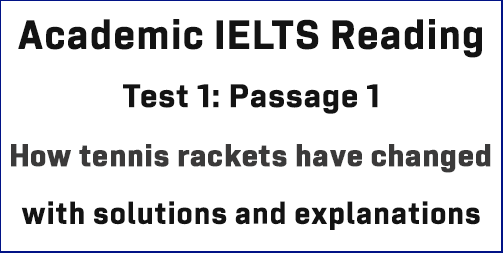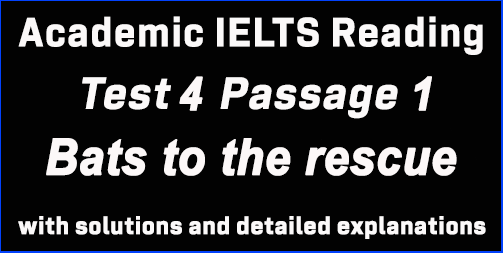IELTS Academic Reading: Cambridge 3 Test 1 Reading passage 3; THE SCIENTIFIC METHOD; with best solutions and best explanations
This Academic IELTS Reading post focuses on solutions to IELTS Cambridge 3 Reading Test 1 Reading Passage 3 titled ‘THE SCIENTIFIC METHOD’. This is an aimed post for IELTS candidates who have great problems finding out and understanding Reading Answers in the AC module. This post can guide you the best to understand every Reading answer quite easily. Finding out IELTS Reading answers is a gradual process, and this post will assist you in this respect.
IELTS Cambridge 3 Test 1: AC Reading Module
Reading Passage 3: Questions 29-40
The headline of the passage: THE SCIENTIFIC METHOD
Questions 29-33: List of headings:
[In this question type, IELTS candidates are provided with a list of headings, usually identified with lower-case Roman numerals (i, ii, iii, etc,). A heading will refer to the main idea of the paragraph or section of the text. Candidates must find out the equivalent heading to the correct paragraphs or sections, which are marked with alphabets A, B, C, and so forth. Candidates need to write the appropriate Roman numerals in the boxes on their answer sheets. There will always be two or three more headings than there are paragraphs or sections. So, some of the headings will not be used. It is also likely that some paragraphs or sections may not be included in the task. Generally, the first paragraph is an example paragraph that will be done for the candidates for their understanding of the task.
Tips to answer this question: Don’t read the list of headings first. Have a quick look at the questions, and go straight to the first question and start reading the paragraph associated with it. Skimming is the best reading technique. You need not understand every word here. Just try to gather the gist of the sentences. That’s all. Read quickly, and don’t stop until you finish each sentence.]
Question no. 29: Paragraph C
Keywords for the question: experiment, Part 1, writer found, blind subjects,
Have a look at the first and last lines of Paragraph C.
The first lines say, “The myth of scientific method is that it is inductive: .. .. ..”
Then the last lines say, “ .. .. . However, the starting point of induction is an impossible one.”
Clearly, the paragraph explains the inductive method.
So, the answer is: iv (Explaining the inductive method)
Question no. 30: Paragraph D
In paragraph D, we find what role hypothesis plays in scientific research. Have a look at lines 9-11, “ . .. . Hypotheses provide the initiative and incentive for the inquiry and influence the method. .. .. .”
Here, Hypotheses provide = the role of hypothesis,
So, the answer is: vii (The role of hypotheses in scientific research)
Question no. 31: Paragraph E
First, take a look at the first few lines of paragraph E, “Hypotheses arise by guesswork, or by inspiration, but having been formulated they can and must be tested rigorously, using the appropriate methodology. .. ..”
Here, they can and must be tested rigorously indicates to the testing of hypotheses.
Then, in lines 11-13, the writer says again, “ .. .. . may be retained until such time as some further test shows it not to be correct. .. .. .”
So, the answer is: iii (The testing of hypotheses)
Question no. 32: Paragraph F
Look at the beginning of paragraph F, “So don’t worry if you have some idea of what your results will tell you before you even begin to collect data; .. .. ..”
Here, what your results will tell you before you even begin to collect data = Anticipating results before data is collected,
So, the answer is: v (Anticipating results before data is collected)
Question no. 33: Paragraph G
In paragraph G, the final lines say, “ . .. . ‘scientific method’ may more usefully be thought of as a way of writing up research rather than as a way of carrying it out.”
Here, more usefully be thought of as a way of writing up research = How research is done and how it is reported,
So, the answer is: vi (How research is done and how it is reported)
Questions 34-35: Identifying information
[This question asks you to find information from the passage and write the number of the paragraph (A, B, C or D … .. ) in the answer sheet. Now, if the question is given in the very first part of the question set, I’d request you not to answer them. It’s mainly because this question will not follow any sequence, and so it will surely kill your time. Rather, you should answer all the other questions first. And just like List of Headings, only read the first two lines or last two lines of the expected paragraph initially. If you find the answers, you need not read the middle part. If you don’t find answers yet, you can skim the middle part of the paragraph. Keywords will be a useful matter here.]
Question no. 34 & 35: In which TWO paragraphs in Reading Passage 3 does the writer give advice directly to the reader?
Keywords for the question: TWO paragraphs, give advice, directly, to the reader,
First, in paragraph B, the writer says in the beginning, “It is essential that you, . .. ..”
This is a piece of direct advice to the reader.
Then, in paragraph F, the writer says again in the beginning, “So don’t worry … . …”
This is another direct piece of advice to the reader.
So, the answers are: (in any order)
- B
- F
Questions 36-39: YES, NO, NOT GIVEN
In this type of question, candidates are asked to find out whether:
The statement in the question matches with the claim of the writer in the text- YES
The statement in the question contradicts with the claim of the writer in the text- NO
The statement in the question has no clear connection with the account in the text- NOT GIVEN
[TIPS: For this type of question, you can divide each statement into three independent pieces and make your way through with the answer.]
Question no. 36: Popper says that the scientific method is hypothetico-deductive.
Keywords for the question: Popper, scientific method, hypothetico-deductive,
In paragraph A, have a look at lines 5-8, “ .. . … position taken by Karl Popper in The Logic of Scientific Discovery (1972, 3rd edition) that the nature of scientific method is hypothetico-deductive .. .. ..”
So, the answer is: YES
Question no. 37: If a prediction based on a hypothesis is fulfilled, then the hypothesis is confirmed as true.
Keywords for the question: if, prediction, hypothesis, fulfilled, is confirmed, as true,
Lines 9-13 in paragraph E say, “ . .. .. If the predictions turn out to be correct then your hypothesis has been supported and may be retained until such time as some further test shows it not to be correct. .. … ..”
Here,
If the predictions turn out to be correct = If a prediction based on a hypothesis is fulfilled,
may be retained until such time as some further test shows it not to be correct = the hypothesis is confirmed as true until some further tests shows it as incorrect,
So, the answer is: NO
Question no. 38: Many people carry out research in a mistaken way.
Keywords for the question: many people, carry out, research, mistaken way,
There is no mention of ‘many people carrying out research in a wrong or mistaken way’ in this passage.
So, the answer is: NOT GIVEN
Question no. 39: The ‘scientific method’ is more a way of describing research than a way of doing it.
Keywords for the question: ‘scientific method’, more, way of describing, research, than, way of doing,
The answers can be found in the final lines of paragraph G, “ .. .. From this point of view, ‘scientific method’ may more usefully be thought of as a way of writing up research rather than as a way of carrying it out.”
Here,
may more usefully be thought of as a way of writing up research = The ‘scientific method’ is more a way of describing research,
than a way of doing it = than as a way of carrying it out,
So, the answer is: YES
Question no. 40: Choosing the main purpose
[This type of question asks you to choose ‘the main purpose’ from the options using the knowledge you gained from the passage. Generally, this question is set found as the last question set in most passages so you should not worry much about it. Finding all the answers for previous questions gives you a good idea about these questions.]
Question no. 40: Which of the following statements best describes the writer’s main purpose in Reading Passage 3?
Keywords for the question: best, describes, writer’s main purpose,
All the different paragraphs in this passage explain different conceptions ‘scientific method’ of research.
So, the best match is: D (to help Ph.D students by explaining different conceptions of the research process)
Click here for solutions to Cambridge 3 Test 1 Reading passage 1
Click here for solutions to Cambridge 3 Test 1 Reading passage 2




Thanks a million for the great explanations, I could not find Cambridge Official Guide book’s TEST 4 reading explanations, are they available on the website? PLS reply ASAP,
Dear Nigar,
I’ll be posting the explanations for The Cambridge Official guide but it might take some time.